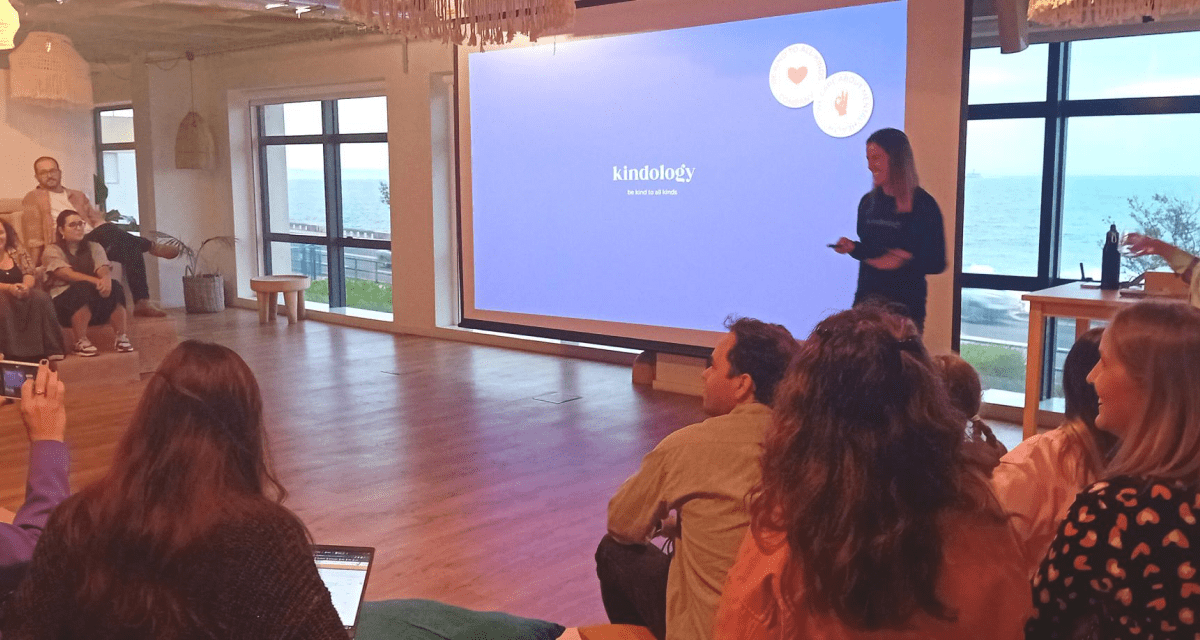Today, the importance of mental health is critical: from childhood to adulthood, burnout, anxiety, and depression have been linked to significant human losses.
The last WYtalk at Casa da Praia hosted Kindology – be Kind to all Kinds, a community of psychologists and therapists, with an innovative proposal for circularity in mental health, committed to promoting it in organizations and also to the search for fulfillment and happiness, in all aspects of life.
The project’s co-founder, Susana Coerver, opened the discussion by outlining Kindology’s goal of democratizing access to mental health care by making it available to everyone. To this end, they have implemented a social responsibility as a service model, offering consultations to people who cannot afford to see a psychologist.
Joana Pena Ferreira, one of the psychologists – “kindologists” – who collaborates with this project – followed to talk about kindness and the concept of happiness, breaking it down into its behavioral and existential aspects.
She revealed the startling revelation that our intrinsic genetic makeup accounts for half of our happiness, with the remaining 40% coming from our deliberate decisions and pursuits and the remaining 10% coming from outside influences. Thus, WYtalk’s focus shifted back to these 40%, who genuinely rely on each of us, our abilities, and the tasks at hand.
Martin Seligman, the father of positive psychology, developed the PERMA-V model to address the relationship between happiness and well-being as well as the impact of positive emotions on our experience of happiness. Joana summarized Seligman’s five motivational components that enhance people’s well-being as follows:
P for Positive Emotions: The importance of positive emotions and resilience, cultivating, exploring, and integrating positive emotions into our daily lives, such as spending time with those we like or investing in hobbies and creative activities that give us pleasure.
E for Engagement: Living the present moment completely, focusing on the tasks we have at hand that make sense to us.
R for Relationships: Feeling supported, welcomed, loved, and valued by others, as our relationships play an important role in well-being and satisfaction, and we must cultivate our inherently social side.
M for Meaning / Purpose: being guided by a life purpose, getting involved with a cause with which we identify, and feeling that we belong. Serving something bigger than ourselves helps us have greater satisfaction with life.
A for Achievements: self-motivation and setting self-proposed goals that are specific and measurable, whether professional or personal, contribute to our well-being.
Throughout this presentation, the psychologist spoke about the active role in our own happiness, that of the community, and also the impact that our actions have on others. He introduced the concept of “power-skills”, behavioral tools, which through their development and training make us truly competent: this competence is the set of our behavioral skills and techniques, the knowledge we bring from life, including the individual experience of each person’s life and our attitude. The skills of conflict management, communication, time management, creativity, curiosity, sense of humor, generosity, honesty, resilience, the importance of error for innovation, among others, are examples of skills that contribute to this construction of competence, and consequently, for a more active and more present perception of happiness.
The importance of resilience was emphasized, along with the need to know how to cope with hardship and smile. Resilience isn’t about holding on until you can no longer, but rather about recognizing your limits, developing coping mechanisms, and learning effective emotional regulation techniques that support the pursuit of happy moments. Since they are abilities rather than ways of being, everything here has been trained and practiced.
The significance of power skills was also discussed about leadership, managing conflicts, managing time and people, and the employee’s responsibility to ensure successful and constructive outcomes in the workplace. It is critical to shift the mindset and methods for fostering a healthy work environment and to establish psychologically secure and happy work settings. This involves examining the nature of the work itself, corporate culture, internal cultures, and individual growth within companies.
The underlying realization that pleasure is inextricably tied to our thoughts, behaviors, and particular acts to enhance both individual and collective well-being was the takeaway from this insightful and motivational WYtalk.
Article originally published in LIDER magazine
